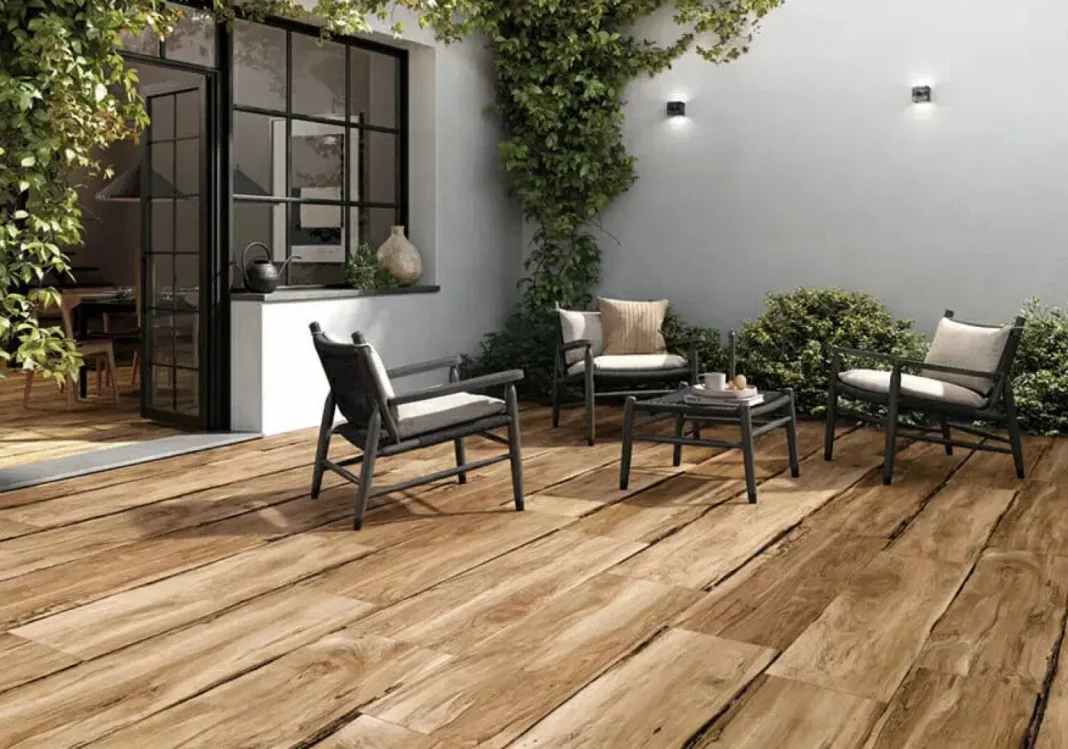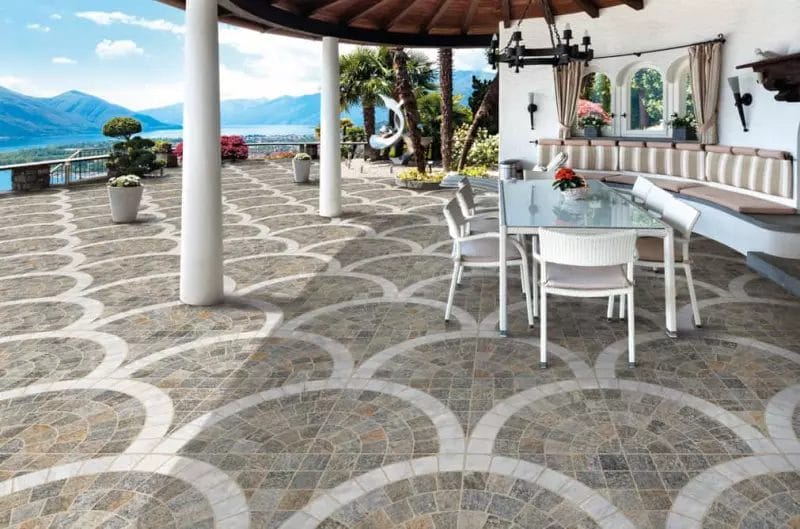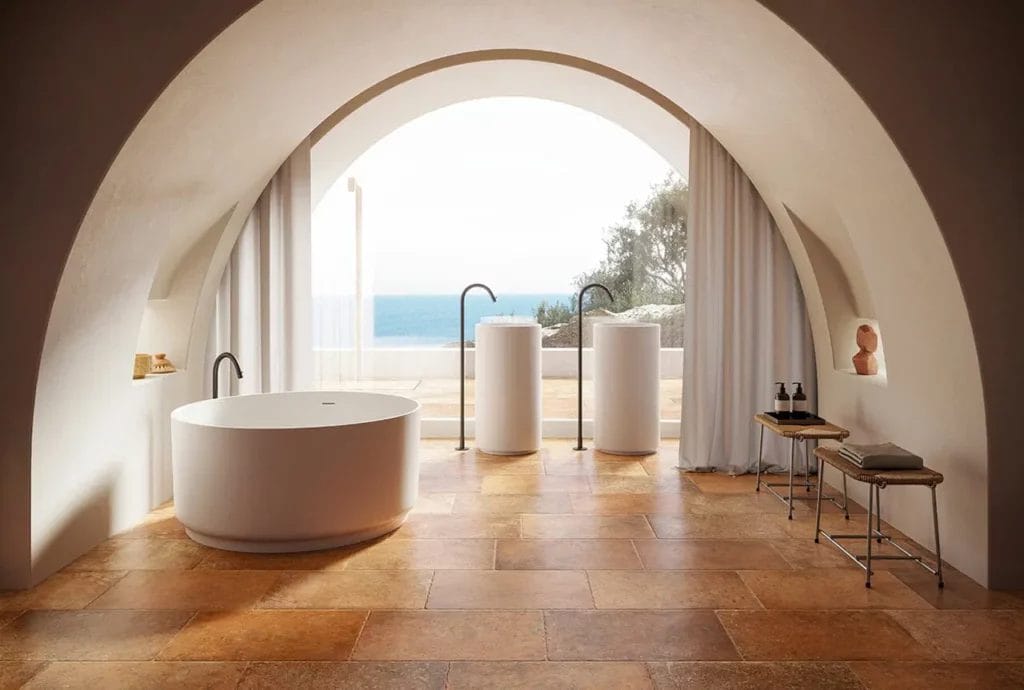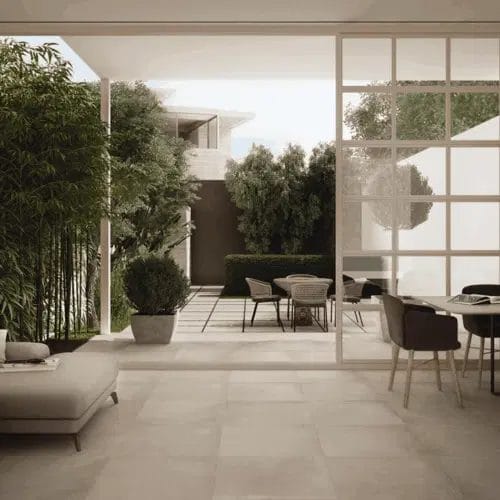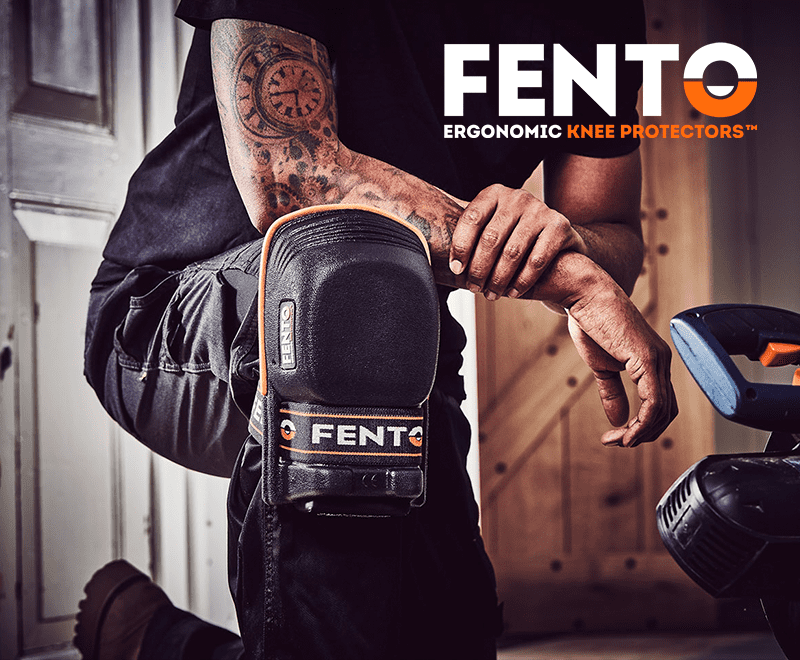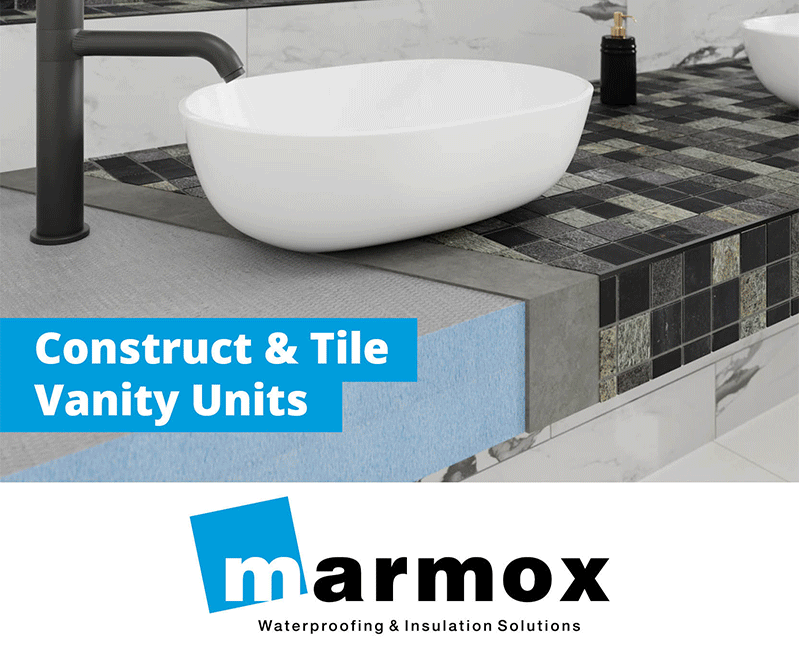Transforming your outdoor space into an extension of your living area is a dream many homeowners share. However, choosing the right flooring can be tricky, especially when navigating the world of tiles. Two popular options, porcelain and ceramic tiles, stand out for their aesthetic appeal and durability and are favoured options for home renovation projects.
The decision between porcelain and ceramic tiles for outdoor use is not just about picking a style or colour; it also involves understanding how these materials perform in various outdoor conditions. From patios and decks to garden walkways, the right outdoor floor tiles can transform the look of your space into an outdoor oasis while ensuring durability and ease of maintenance.
In this blog, we will delve into the world of outdoor porcelain and ceramic tiles, shedding light on their distinct characteristics, advantages and limitations.
1. Understanding Outdoor Porcelain Tiles
Outdoor porcelain tiles have gained popularity for their robustness and aesthetic appeal, making them a top choice for many homeowners when it comes to outdoor flooring.
➡️ What Are Porcelain Tiles?
Porcelain tiles are a subset of ceramic tiles, but they differ significantly in their composition and properties. Made from a more refined clay, they are fired at higher temperatures compared to ceramic tiles. This process results in a denser, less porous and harder material.
➡️ Manufacturing Process:
The journey of creating an outdoor porcelain tile begins with the selection of fine, natural materials like clay, feldspar and silica. These ingredients are ground into a fine powder and mixed to form a homogeneous blend. The mixture is then pressed under high pressure to form the tile shape.
- What follows is the key process: Firing the tiles at extremely high temperatures (about 1200-1400°C). This high temperature vitrifies the tiles, making them incredibly dense and non-porous.
- The result is an outdoor tile with remarkable strength and moisture resistance.
➡️ Characteristics of Outdoor Porcelain Tiles:
- Durability: Porcelain tiles are known for their exceptional durability. They are resistant to scratches, stains and wear, making them ideal for high-traffic outdoor areas.
- Low Porosity: Their low porosity makes them highly resistant to water absorption, which is crucial for outdoor applications, especially in regions with freeze-thaw cycles.
- Fade Resistance: These tiles are less likely to fade over time, even when exposed to direct sunlight, thanks to their colouration process and inherent material properties.
- Variety in Design: Advances in manufacturing technologies have enabled the production of outdoor porcelain tiles that mimic natural materials like wood, stone and even concrete, providing endless design possibilities.
➡️ Advantages of Outdoor Porcelain Tiles:
Outdoor porcelain tiles offer many benefits, making them a preferred choice for many homeowners and designers. From their resilience in various weather conditions to their aesthetic versatility, these tiles provide practical and attractive solutions for outdoor spaces.
✅ Durability and Strength:
- One of the most significant advantages of outdoor porcelain tiles is their exceptional durability and strength.
- These tiles are also fade-resistant; they are made to endure harsh weather conditions, be it scorching sun, heavy rain or freezing temperatures.
- The high temperature at which these tiles are fired makes them resistant to cracking and breaking, ensuring longevity even in areas with high foot traffic.
- Their robust nature makes them an ideal choice for outdoor settings like patios, pool areas, gardens and walkways.
✅ Low Maintenance:
- Porcelain tiles are renowned for their ease of maintenance.
- Their dense and non-porous nature means they don’t hold onto dirt or stains easily.
- Regular cleaning usually involves just sweeping and occasional mopping with water, possibly with a mild detergent.
- They do not require sealing or special treatments to maintain their appearance, making them a convenient option for busy homeowners.
✅ Aesthetic Variety:
- The design possibilities with outdoor porcelain tiles are almost limitless.
- Modern manufacturing techniques allow these tiles to mimic the look of natural stone, wood, and other materials, offering a range of aesthetic choices to suit any design preference.
- Whether you are aiming for a rustic, traditional or contemporary look, there is likely a porcelain tile that fits the bill.
✅ Water Resistance:
- Porcelain tiles exhibit excellent water resistance, making them an ideal choice for outdoor areas prone to wetness like pool surrounds or outdoor kitchens.
- Their low porosity prevents water absorption, reducing the risk of damage during freeze-thaw cycles.
- This feature also makes them resistant to mould and mildew growth, ensuring a safe and clean outdoor environment.
➡️ Disadvantages of Outdoor Porcelain Tiles:
Despite their many advantages, outdoor porcelain tiles also come with some drawbacks that need to be considered. Here are the main disadvantages:
❌ Cost:
- One of the primary drawbacks of outdoor porcelain tiles is their cost. They are generally more expensive than ceramic tiles and some other outdoor flooring options.
- The higher cost is due to the more complex manufacturing process and the quality of the materials used. For those on a tighter budget, this might be a significant consideration.
❌ Installation:
- Installing outdoor porcelain tiles can be more challenging than other types of tiles. Their density and hardness require special cutting tools and expertise, often necessitating professional installation.
- This not only adds to the overall cost but also means that DIY installation might not be a feasible option for many homeowners however, you can hire cutters to get the job done.
In summary, outdoor porcelain tiles are an amalgamation of beauty and brawn. They offer a practical yet elegant solution for outdoor flooring, combining longevity and style but at a slightly higher cost.
2. Understanding Outdoor Ceramic Tiles
While outdoor porcelain tiles are a popular choice, outdoor ceramic tiles also hold a significant place in the world of exterior design.
➡️ What Are Ceramic Tiles?
Ceramic tiles are made from natural clay that is kiln-fired to achieve hardness. They are a versatile and traditional choice for outdoor spaces, offering a variety of colours, patterns and textures. While generally not as hard as porcelain tiles, modern ceramic tiles can still be a durable option for outdoor use. They are often chosen for their aesthetic appeal and the warm, earthy character they can bring to an outdoor setting.
➡️ Manufacturing Process:
The process of making ceramic tiles begins with the selection of a type of clay. This clay is cleaned, mixed with water, and then formed into the desired shape of the tile.
- Lower Temperature Firing: Unlike porcelain tiles, ceramic tiles are fired at a lower temperature, typically around 1000-1100°C. This results in a product that is less dense and more porous than porcelain.
- Glazing: After the first firing, the tiles are usually glazed. This glaze, which can be glossy, matte, or textured, not only adds to the aesthetic appeal but also provides a protective layer, though it doesn’t make them as impermeable to water as porcelain tiles.
➡️ Differences from Porcelain:
- Material Composition and Density: The primary difference between ceramic and porcelain tiles lies in their composition and density. Ceramic tiles are made from a coarser clay and are less dense compared to the finely ground clay used in porcelain tiles.
- Firing Temperature: Ceramic tiles are fired at lower temperatures than porcelain, making them slightly less durable and more porous.
- Water Absorption: Due to their higher porosity, ceramic tiles absorb more water than porcelain tiles, making them less suitable for extremely wet conditions or areas with freeze-thaw cycles.
- Durability: While still durable, ceramic tiles are generally more prone to wear and chipping compared to porcelain tiles.
- Cost and Installation: Ceramic tiles are often less expensive than porcelain tiles and are easier to cut and install, making them a more budget-friendly and DIY-friendly option.
➡️ Advantages of Outdoor Ceramic Tiles:
Outdoor ceramic tiles, with their unique blend of affordability, aesthetic diversity, and comfort, present a compelling option for those looking to enhance their outdoor spaces. Each of these advantages plays a crucial role in their popularity for exterior applications.
✅ Cost-Effectiveness:
- A primary advantage of outdoor ceramic tiles is their affordability. When compared to porcelain tiles and other outdoor flooring materials, ceramic tiles often come with a lower price tag.
- This cost-effectiveness makes them an attractive option for homeowners working within a tight budget, without necessarily compromising on quality or aesthetic appeal.
✅ Design Flexibility:
- Ceramic tiles offer a vast array of design possibilities. They are available in a multitude of colours, patterns and finishes, allowing for significant creative freedom in designing outdoor spaces.
- This diversity enables property owners to personalise their spaces to reflect their tastes and complement the surrounding architecture and landscape.
✅ Comfort:
- In terms of underfoot comfort, ceramic tiles often have an edge over porcelain tiles. They tend to retain less heat, making them cooler to the touch in sunny conditions, which is particularly advantageous in pool areas, patios or other barefoot zones.
- Additionally, their slightly softer composition compared to porcelain, offers a more comfortable walking experience, enhancing the usability of outdoor living spaces.
➡️ Disadvantages of Outdoor Ceramic Tiles:
Despite their advantages, outdoor ceramic tiles also come with certain drawbacks that should be carefully considered before making a selection.
❌ Durability Concerns:
- Ceramic tiles, while durable, are generally not as hardy as porcelain tiles. They are more prone to wear and tear, and susceptible to cracking and chipping, especially in areas with heavy foot traffic or under harsh weather conditions.
- This reduced durability can limit their lifespan and might necessitate more frequent replacements compared to more robust materials.
❌ Maintenance:
- Due to their higher porosity, ceramic tiles may require more maintenance than porcelain tiles. They can absorb more water and stains, which means they might need regular sealing and more frequent cleaning to maintain their appearance and integrity.
- This increased maintenance demand can add to the long-term upkeep costs and efforts.
❌ Weather Resistance:
- Ceramic tiles are less adept at handling extreme weather conditions, particularly in areas with freeze-thaw cycles.
- The higher water absorption rate can lead to cracking and damage during cold weather, making them a less ideal choice for climates that experience severe winters.
- This factor is crucial to consider for ensuring the longevity and performance of the tiles in outdoor settings.
In summary, outdoor ceramic tiles offer a charming, more cost-effective and versatile option for outdoor spaces, with a wide range of aesthetic possibilities. However, their physical properties and performance characteristics differ from porcelain tiles, which should be considered when choosing the right tile for your outdoor project.
3. Making the Final Call
Ultimately, the best tile for your outdoor haven boils down to your priorities and preferences. If budget is a major concern, ceramic might be your champion. However, if durability and minimal maintenance are your top priorities, porcelain reigns supreme. Consider factors such as climate, traffic flow, desired aesthetics, and your DIY skills to make an informed decision.
Remember, whichever material you choose, proper installation and regular care are key to ensuring your outdoor tiles flourish for years to come. So, unleash your inner designer, weigh the pros and cons, and get ready to step into a beautifully tiled outdoor haven that reflects your unique style and personality.
Best of Both Worlds
If you are still undecided, consider mixing and matching! Use porcelain in high-traffic areas and ceramic in less demanding spaces. This way, you can enjoy the best of both worlds without breaking the bank or compromising on style.
4. Choose EMC Tiles For All Your Tiling Needs!
With over 40 years in the tiling industry, there is not much we haven’t come across! EMC Tiles is a reputable East Midlands provider of floor and wall tiles, offering a wide range of products suitable for various spaces, including outdoor areas. We specialise in different styles, materials and finishes, catering to diverse design preferences from modern patio tiles, to rustic garden designs, sunkissed poolsides and more.
Visit our website or pop into one of our showrooms and we would be delighted to guide you through the product selection, ensuring that the tiles you choose are appropriate for the specific environmental conditions and aesthetic desires you require!


